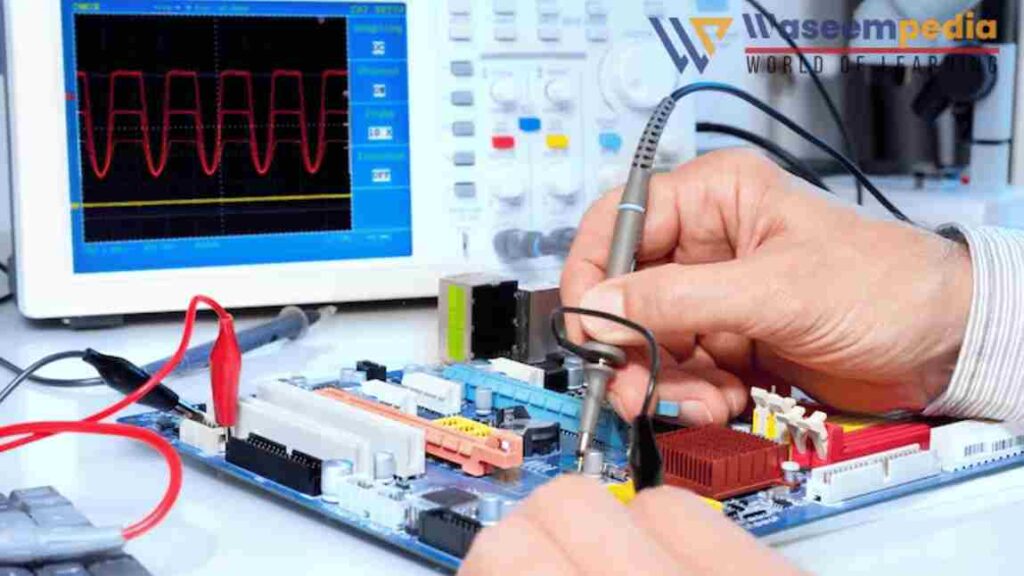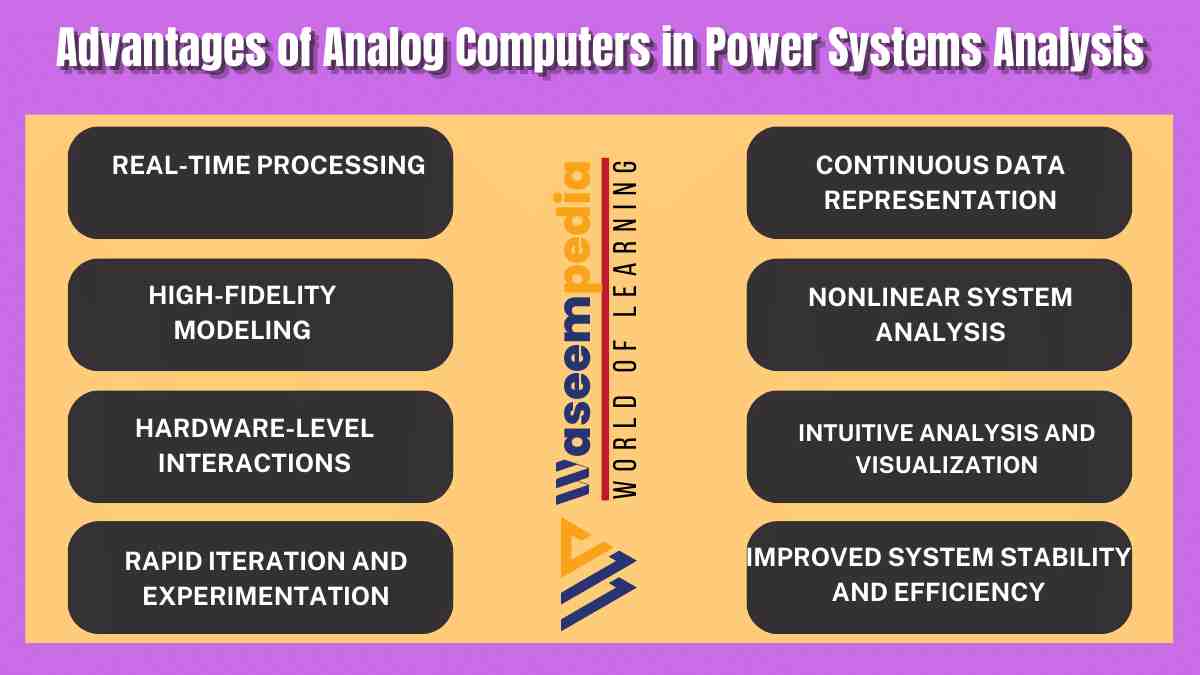Analog computers offer significant advantages in power systems analysis, including real-time processing, continuous data representation, high-fidelity modeling, nonlinear system analysis, hardware-level interactions, intuitive analysis and visualization, and rapid iteration and experimentation.
While digital computers and software tools have become prevalent in power systems analysis, analog computers continue to provide valuable tools for enhancing the analysis process and gaining a deeper understanding of power system dynamics. The combination of analog and digital approaches can contribute to more accurate analysis, improved system stability, and efficient operation of power systems.

In this article, we will explore the advantages of analog computers in power systems analysis and understand their significance in this domain.
What is Analog Computers?
Analog computers process information using continuous physical quantities, such as voltages or currents, to represent and manipulate data. Unlike digital computers that operate on discrete values, analog computers can directly model and simulate the behavior of power systems. In the context of power systems analysis, analog computers offer an alternative approach to understanding and interpreting power system dynamics.
Advantages of Analog Computers in Power Systems Analysis
Advantages of Analog Computers in Power Systems Analysis are asd following.
1. Real-Time Processing
one of the Advantages of Analog Computers in Power Systems Analysis is Real-time processing is critical in power systems analysis, as it enables immediate analysis and response to changing system conditions. Analog computers excel in real-time processing due to their ability to work with continuous data streams without the need for digitization or discretization.
This real-time capability allows engineers and analysts to monitor system parameters, perform calculations, and make adjustments in real-time, facilitating timely decision-making and ensuring the stability and reliability of power systems.
2. Continuous Data Representation
Analog computers utilize continuous data representation, which is advantageous in power systems analysis. Power systems are dynamic and subject to continuous variations in voltage, current, and other system parameters.
Analog computers preserve the fidelity of system data without the quantization errors associated with digital systems. By working with continuous data, analog computers can provide a more accurate representation of power system behavior, enabling engineers and analysts to analyze and interpret system dynamics with higher precision.
3. High-Fidelity Modeling
one is the most important Advantages of Analog Computers in Power Systems Analysis is High-Fidelity Modeling. Analog computers excel in high-fidelity modeling of power systems. By directly simulating the continuous behavior of power variables, analog computers can accurately capture the dynamics of complex power system phenomena.
This high-fidelity modeling allows engineers and analysts to assess the behavior of power systems under various conditions, evaluate system stability, and optimize system performance.
4. Nonlinear System Analysis
Power systems often exhibit nonlinear behavior, making their analysis and interpretation challenging using traditional mathematical methods. Analog computers are well-suited for analyzing nonlinear power systems, as they can directly model and simulate the nonlinear relationships between system variables.
By leveraging the continuous nature of analog computation, analog computers enable engineers and analysts to study the effects of nonlinear phenomena, such as voltage instability or system oscillations, and enhance the understanding of complex power system dynamics.
5. Hardware-Level Interactions
Analog computers enable hardware-level interactions in power systems analysis. Engineers and analysts can directly interface analog computers with physical components of power systems, such as generators, transformers, or protective relays, allowing for real-time measurements and analysis of system behavior.
This hardware-level interaction enhances the accuracy and timeliness of power systems analysis, as engineers and analysts can evaluate the behavior of power systems and assess data in real-time with direct connections to physical components.
6. Intuitive Analysis and Visualization
Analog computers offer an intuitive approach to analysis and visualization in power systems. Engineers and analysts can physically connect and manipulate analog components to analyze system data and visualize power system behavior.
This hands-on interaction allows for a deeper understanding of the relationships between system parameters and phenomena. Analog computers provide an intuitive platform for engineers and analysts to explore and experiment with different scenarios, facilitating effective analysis and visualization of power system dynamics.
7. Rapid Iteration and Experimentation
Analog computers facilitate rapid iteration and experimentation in power systems analysis. Engineers and analysts can quickly modify system parameters, simulate the behavior of the modified system in real-time, and observe the immediate effects.
Analog computers offer a hands-on approach to analysis and experimentation, allowing for direct interaction with the simulated power system environment and exploration of different scenarios. This iterative process of experimentation accelerates learning, optimization, and the discovery of insights in power systems analysis.
Related FAQ’s
How do analog computers differ from digital computers in power systems analysis?
Analog computers process continuous data and directly model power system behavior, while digital computers operate on discrete values and rely on algorithms for analysis.
What advantages do analog computers offer in power systems analysis?
Analog computers excel in real-time processing, continuous data representation, high-fidelity modeling, nonlinear system analysis, hardware-level interactions, intuitive analysis and visualization, and rapid iteration and experimentation.
Why is real-time processing important in power systems analysis?
Real-time processing enables immediate analysis and response to changing power system conditions, ensuring the stability and reliability of power systems.
How do analog computers handle nonlinear power system analysis?
Analog computers can directly model and simulate the nonlinear relationships between power system variables, enabling the study and analysis of nonlinear phenomena in power systems.
Why are hardware-level interactions valuable in power systems analysis?
Hardware-level interactions allow for real-time measurements and analysis of power system behavior, enhancing the accuracy and timeliness of power systems analysis.

